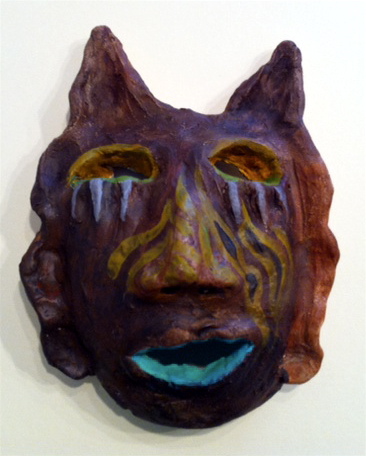 |
| ©2011, Hannah Klaus Hunter, Ceramic Cat Grief Mask |
I like to imagine that there are as many ways to say good bye as stars in the sky. Like stars, each goodbye is unique, with its own distinct light. This was the last week in our bi-annual Young Adult Bereavement Art Group that we affectionately call "YABAG." Perhaps its me, perhaps it's time passing, but it seems that each group gets better and better.
In the first week we ask what brings each person to the group. One young woman's response, "Art, Bereavement, Support," formed the personality of our present group. That's what we did.
Aside from piloting my way through my own childrens' teenage years, facilitating through the 8 weeks is one of the most difficult things I do, and, at the same time, the most subtle. The knowledge of when to speak and when to refrain from speaking, when to lean on someone just a bit so that they'll speak even without feeling pressured is as delicate a process as inserting an IV needle.
For 8 weeks these young adults came week after week to sit with us and wind their way through their dark tunnels of grief. Each week, after the evening was over, my co-facilitator and I told each other that we wanted to adopt each one of them. Certainly, I wanted to rescue them from their pain. And, since that wasn't possible, I spent a lot of time figuratively sitting on my hands.
During the last two weeks, group members paint clay masks that they've made several weeks earlier and construct a memory box containing images and symbols that speak to their memories of the person who died. Often these are not literal pictures of the person, but images they've found in magazines or pictures they've painted inside and outside of the box.
I think of this box as a tool kit. Alongside the memories residing invisibly inside the box, there is also the knowledge of the coping tools they've learned in the group; how to address the non-grievers, how to approach a holiday without feeling you're about to fall off a cliff and how there are others like you with whom you can travel. Going it alone becomes an option rather than a necessity.
As the group ended that night we sat quietly. My co-facilitator and I had said our goodbyes. Group members expressed their wishes that the sessions could continue longer ("I could paint for hours"), but I thought that as usual, they would take off quickly, disappearing into the darkness of night. But they sat. And sat.
I'm one of those people who have to take it on faith that sometimes the most important thing I can do as a therapist is to listen and be present. An old mentor used to caution me over and over: "Don't rush the river." But I've always found so much comfort in doing. It makes me feel better. But as I pondered these young people the next morning, I realized why they continued to sit for so long. There was comfort in simply being together. No words, not even images were necessary. They and their memories could dwell comfortably in the half-light.
